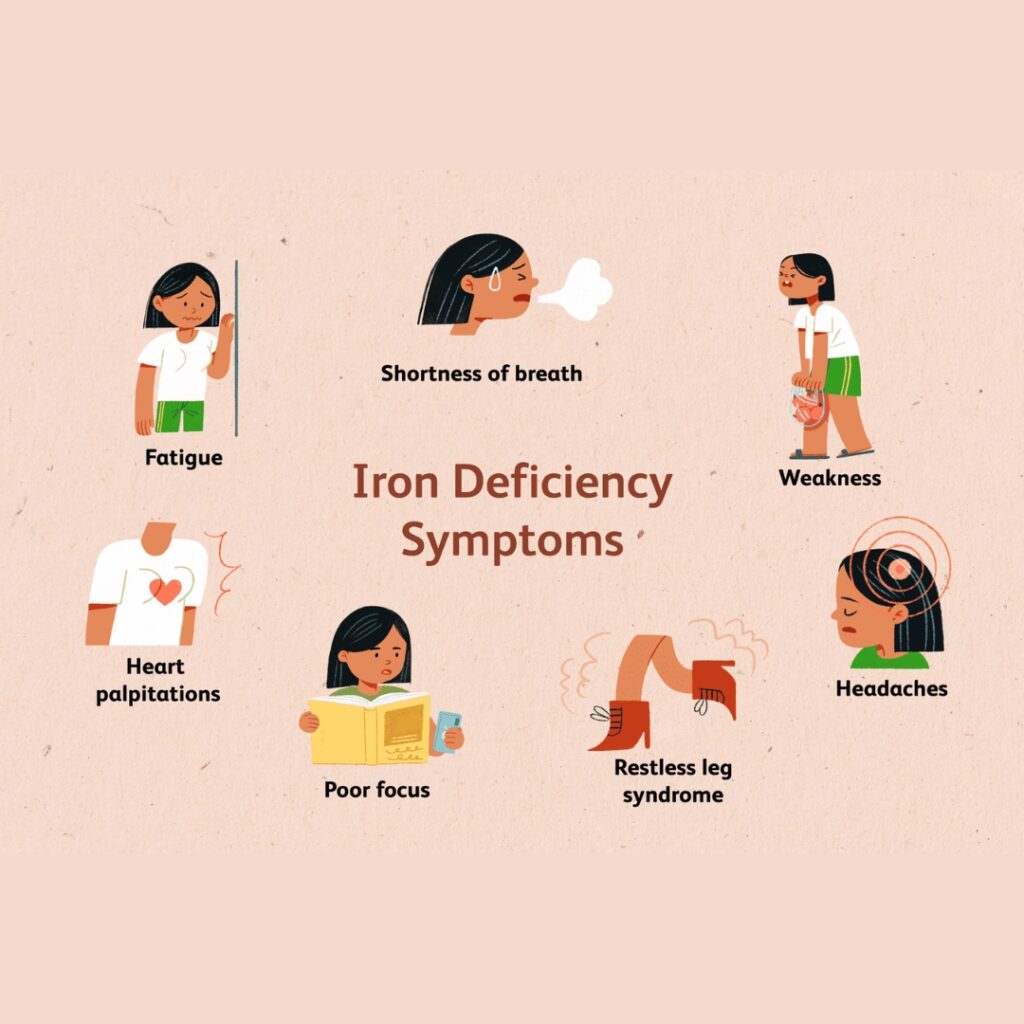We may not realize that fatigue or weakness can be caused by iron deficiency, but it is a common symptom. Iron is derived from certain types of foods. And if you are not eating enough of those iron-rich foods, you may be missing out on a significant portion of your iron intake.
Iron deficiency can also lead to anemia, which develops for a number of reasons:
- You lose more blood that contains iron than the human body needs
- The human body struggles to make iron
- The human body is not getting enough iron in the diet
- The human body needs more iron than normal. Biological sex, lifestyle, underlying health conditions, and age can also make people more susceptible to iron deficiency. Read on to learn how much iron does your body need? Iron deficiency symptoms and how to get more iron in the diet?
Fortunately, we can get iron from a variety of foods such as:
- Red meat, poultry, pork
- Beans and peas
- Seafood
- Dark leafy vegetables such as kale and spinach
- Raisins, apricots and other dried fruits
- Nuts
- Iron-rich starches such as pasta and cereals
Did you know? If we menstruate, we can lose iron due to blood loss. Infants and children can also be deficient in iron if they do not get enough breast milk or formula. Infants and children need extra iron during growth periods for growth. You may need extra iron if you donate blood frequently. Vegetarians and non-vegetarians can also suffer from iron deficiency anemia if they do not seek alternative sources of iron with enough meat and seafood.
Pay attention to the possible side effects of iron deficiency:
Now you must be wondering how do I know if I have iron deficiency? There are several main symptoms of iron deficiency that we should pay attention to, some of them seem like common illnesses such as headaches or the side effects can be more unexpected such as wanting to eat dirt.
- Excessive fatigue and weakness:
Extreme fatigue or weakness is a common symptom that tells us whether we have iron deficiency or not. If our body does not get enough iron, then our body is not able to produce red blood cells properly, so our body’s blood flow is not efficient in taking oxygen. Oxygen is not able to go where it should go, due to which we feel very weak and tired.
- Chest pain:
Due to iron deficiency, a person can have chest pain, fast heartbeat and shortness of breath. This can also be because oxygen is not able to reach the place where it should go through the blood flow efficiently.
- Headache, mild headache and dizziness:
Although headache and dizziness are common diseases, but if there is iron deficiency in our body, then our brain also gets less oxygen, due to which mild headache and dizziness keep on happening. Headache and migraine are also associated with anemia caused by iron deficiency.
- Cold hands and feet:
Due to iron deficiency, our body does not get enough oxygen, due to which a person can also feel cold. Because due to iron deficiency, the human body has many difficulties in preserving oxygen through blood flow, so your hands and feet can become cold.
- Loss of appetite:
On the other end of the spectrum, you may not feel hungry at all. There are many reasons for this which are not clear, according to some theories, it has been told that it is related to the level of some hormones and blood proteins, due to which there is no appetite.
- Yellowing of the skin:
If there is iron deficiency in a human body, then his skin may look jaundiced and washed. Iron deficiency causes a decrease in red blood cells, which causes the skin to turn yellow.
What is the main cause of iron deficiency?
There are many reasons for iron deficiency in the human body. The first reason is that the person is not getting enough iron in his diet. Heavy or prolonged and continuous menstruation, injury, illness, cancer or gastrointestinal bleeding or blood donation can also cause blood loss, for which it can be responsible. Even if a person bleeds from the nose, he may have iron deficiency. Pregnant women are also at risk of iron deficiency because more iron is required for blood volume and their growth, due to which pregnant women also show symptoms of anemia. There are also some gastrointestinal disorders in our body that can hamper our body’s ability to absorb iron-containing foods.
Rare causes of iron deficiency include some stomach infections, gastrointestinal surgery and genetic conditions.
How to add more iron to your diet:
If you feel like you’re not getting enough iron, you can get a blood test from your doctor to see if you have an iron deficiency. If so, you can try adding more iron to your diet:
You may want to increase the amount of iron in your diet by cooking in a cast iron pan and collecting recipes that contain iron-rich foods.
- Eating nuts and seeds throughout the day
- Eating whole grains
- Pairing foods rich in vitamin C, vitamin A and beta-carotene with iron-rich foods.
- Eating iron-rich cereals or breads
- Spinach, peas, lentils, white mushrooms or black olives
Sometimes it becomes difficult to include iron-rich foods in your diet due to low food budget or busy lifestyle. For this, you can also consider using oral iron supplements or multivitamins, but you must consult a doctor once before using it.

